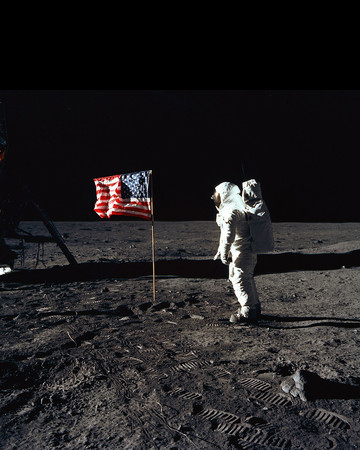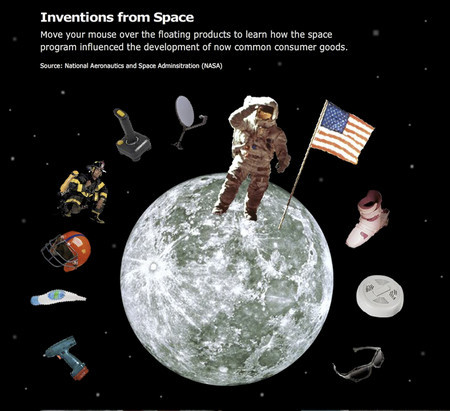Moon landing taught us much about science — and ourselves
Looking back on it, the summer of 1969 was pretty interesting.
Woodstock. Ted Kennedy and Chappaquiddick. The amazing New York Mets. Hurricane Camille.
And this: For the first time in human history, two human beings stood on the surface of another planet.
OK, it wasn't technically a planet. Just Earth's own moon. But, for a brief moment in our human timeline, absolutely everything changed.
July 20 will mark the 40th anniversary of Apollo 11's landing in the Sea of Tranquility and Neil Armstrong's historic hop, just over six hours later, onto the moon's surface.
For those who saw it live on TV, the flight of Apollo 11 was a once-in-a-lifetime experience.
But, with the benefit of 40 years' hindsight, did it change us? Make us look at life differently? Give us any tangible benefits?
Andrew Chaikin hears such questions often. He's the author of several space and science books, including "A Man on the Moon," the basis for the HBO miniseries "From the Earth to the Moon," and the recently published "Voices From the Moon" (Viking Studio, $29.95), which explores the Apollo moon landings through interviews with the astronauts who manned them.
"It's impossible to avoid," Chaikin says during a phone interview from his Vermont home. "People want to know ... was it worth it?" If you're of a practical mindset, technology is as good a place to begin as any. According to NASA, the dizzying array of products that use technologies or materials originally developed for the space program includes: TV satellite dishes, medical imaging devices, the in-the-ear thermometer, fire-resistant materials used in firefighting, smoke detectors, sunglasses, cordless power tools, the Space Pen, shock-absorbing materials used in helmets, the joystick video game controllers and, even, golf balls.
And that list doesn't even count such now-taken for granted advances as global positioning devices, food freeze-drying and preservation processes, and communication and weather satellites.
"I mean, you can go on the computer and see a live weather report by satellite from halfway around the world," Chaikin notes.
In addition, the space program and Apollo moon landings were "spectacular" from a scientific perspective, Chaikin says.
"What we learned about the moon and the origin of the moon and the early history of the Earth and solar system from Apollo is still being sifted through and understood," he notes.
However, the most profoundly significant tangible objects we got from the moon landing and the Apollo program may well have been those photos that show what the Earth looks like from the lunar surface.
"There was this incredible leap in awareness that we got from looking homeward from all that distance and seeing the Earth as a precious and tiny oasis of life in the vastness of space," Chaikin says.
"That is a very profound shift in perspective that Apollo gave us that we still need to absorb. We are still trying to get with the fact that the Earth is a world to be cherished and protected."
Bishop Dan Edwards of the Episcopal Diocese of Nevada agrees, likening those Apollo-era photos to "a God's-eye view of the Earth and humanity. And from that perspective, we were able to see that we really are all one planet and one intricately connected ecosystem."
Maybe it wasn't coincidence that the first Earth Day celebration was held in April 1970, just nine months after Apollo 11. But, says Felicia Campbell, an English professor at the University of Nevada, Las Vegas, "I think that was important for the environmental movement."
Seeing the Earth from the vantage point of the moon, Edwards says, demonstrated that "this is a rare and beautiful spot of light in the universe, something to be treasured and cared for."
The effects of that new, broader perspective even rippled out to humans' relationships with one another, Edwards says, helping us to "understand ourselves and our relationships in a dramatically different way,"
As we saw ourselves as inhabitants of a single planet, "we've seen the world grow smaller," he says, and we've strengthened our "interconnections to people from different cultures."
The moon landing also gave mankind a lesson in perseverance and determination. A mere 12 years had elapsed from Sputnik to Apollo 11. And that, John H. Mowbray says, showed us that nothing is really impossible.
"We had a significant challenge and the odds were not in our favor," explains Mowbray, a Las Vegas attorney and astrophotographer. "And if nothing else, it's a good history lesson on what the human mind can accomplish with the right motivation and resources."
The moon landing was "a tremendously inspiring event," Chaikin agrees. "It shows us that human beings can accomplish seemingly impossible things when they work together for something that's greater than the individual."
The moon landing's effects also spread throughout popular culture. Chaikin jokes, for instance, that it ended the metaphorical career of the phrase "as crazy as putting a man on the moon."
It affected science fiction, too, removing, perhaps, a bit of the gee-whiz naivete seen in previous decades. Campbell, who teaches science fiction courses at UNLV, says she fell away from reading science fiction in the '80s and picked it up again only recently.
"I'm doing a course now, but I sort of lost interest for a while," she says. "It seemed like it had all come true."
On the other hand, Rob Lambert, president of the Las Vegas Astronomical Society, suspects that George Lucas ("Star Wars") and other creators of post-Apollo 11 sci-fi films "were inspired by what happened in 1969 and the early '70s. I'm not sure we would have had those movies had we not gone and done that."
Lambert even was struck recently by how much today's cell phones bear an eerie resemblance to classic "Star Trek" communicators, and wonders if the moon landing and space program also had an effect on other latter-day products and innovations.
The moon landing "had to do with the imagination and getting the creative juices flowing," he explains. "That happens not only in movies but technology. Some of the things that were not reality back at that point have come to fruition."
Apollo 11 even led William Culbreth to a career. He was 15 then, and calls the moon landing "a transitional point for a lot of us at the time."
"For me, I hadn't really thought of going into engineering or science," explains Culbreth, associate dean of UNLV's College of Engineering. "I think that threw a whole generation of kids into thinking about (careers in) science and engineering."
Fittingly, Culbreth now teaches compressible flow and nuclear engineering, topics that, he notes, are "directly related to the space program."
Yet, for many -- even for those who marveled at it firsthand four decades ago -- the 40th anniversary of the Apollo 11 moon landing will pass by with barely more than the briefest flash of acknowledgement. But that doesn't necessarily mean space exploration has become a victim of our modern-day been there/done that worldview.
For instance, Chaikin says, "I really think kids are in love with exploration, and going into space is part of that.
"I do school visits of all grade levels, from kindergarten to college. But in talking to kids, their eyes just light up when you talk to them about space exploration. They love it, and some of them know amazing details.
"I think all of us have an explorer inside us, and we're always longing for that experience at some level," Chaikin says.
"People like to be amazed. They like to experience wonder, and that's what space exploration does. It sort of grabs you by the lapel and says, 'This is the big picture -- the really big picture.' "
Contact reporter John Przybys at jprzybys@reviewjournal.com or 702-383-0280.
Inventions from space




















